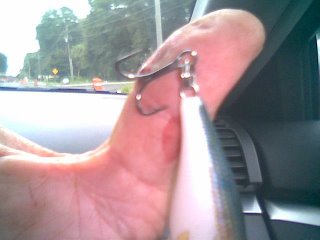So I was able to load some photos from the baseball game. I can't speak for the rest of us, but I had a good time. The game was actually pretty good too... and the Rockies won.



Homer quote of the day: when asked if both cigarettes he is smoking are his... in a bland monotone voice, "Yes, I am in flavor country ..... its a big country."

On the career fair... Colorado School of Mines is obviously a school with a Engineering and Science focus, hence many companies recruit here to find the engineers and scientists they need... they don't know how to handle someone not graduating with a engineering or science degree. The challenge is to get a reputation as a school that also supplies business oriented professionals similar to an MBA program from it Economics and Business Division or the many joint/dual degree programs that it offers in conjucntion to the engineering or science degrees. To me this would take 3 steps:
1. Educate the CSM Career Center as to the specific attributes of the Econ and Biz Division, the Engineering & Technology Management Program, The Institute of French Petroleum Joint Program ect... So that they may better sell the programs. Let's be real here: with the lack of human captial in the engineering and sciences right now and with the reputation the school has; these engineering and science degrees sell themselves.
2. Research companies and their development programs that might be a fit for these graduates. It seems that many of the graduates have chose to pursue the Economics and Business Division at CSM instead of MBA, so look for development programs for MBAs.
3. Educate target companies of the programs and how they fit they comapnies needs; not by sending information, not by sending emails; instead via a phone call with the Director of Recruiting for the company and the Director of the CSM Career Center. Possibly invite a Professor from the department to sit in on the call as well.
The thing I noticed from this career fair, was that I was getting advice from recruiters on how to get a job with their company and much of this advice was to start as an entry level position and work my way up. Not to sound cocky, but if I wanted an entry level position, I would just go get one; then I would have years of entry level service and middle management to go through before get to a position of fiduciary responsiblity and that would probably not come in todays competitive market without more formal schooling. BUT WAIT... most of these students in the Economics and Business Division Programs are hoping to accelerate that pace of progression with a very pertinent formal course of study in what it takes to make business decisions on objective analysis... taking business strategy and economic analysis to what might be argued "a science". Not that we are opposed to entry level positions, but that many of us don't want an typical engineering position or geology position that could otherwise be had by anyone with said degree.
In closing the historical career path of years of service and gradual promotion with an emphaisis on tenure within an organization is a thing of the past. Employers are finding this diffifult to cope with. See the book: Knowledge Nomads and the Nervously Employed...". Those companies that accomodate these avid human capital innovating employees will lead the way. I have heardof some of Google's philosophy and approaches to attracting, motivating and retaining its employees and was impressed.
Enough on that...
Here are some references:
"KNOWLEDGE NOMADS AND THE NERVOUSLY EMPLOYED is terrific. Feller and Whichard deploy a large arsenal of facts and their own keen analytic powers to take readers through the realities of careers and career advising in the 21st century. What's more, instead of offering hackneyed insights and predictable advice, they call for something urgently needed in our national life: courage. This book is a must-read for any current or aspiring career development professional."
Daniel H. Pink, author of FREE AGENT NATION and A WHOLE NEW MIND
http://www.google.com/jobs/reasons.html

 This is a sea of cubicles in corporate America. Mind you this is 1/4 of a single floor. Heh heh. Cheers to all those who shepard investor constirbutions by working diligently in pursuit of company objectives.
This is a sea of cubicles in corporate America. Mind you this is 1/4 of a single floor. Heh heh. Cheers to all those who shepard investor constirbutions by working diligently in pursuit of company objectives.  Press On.
Press On.








